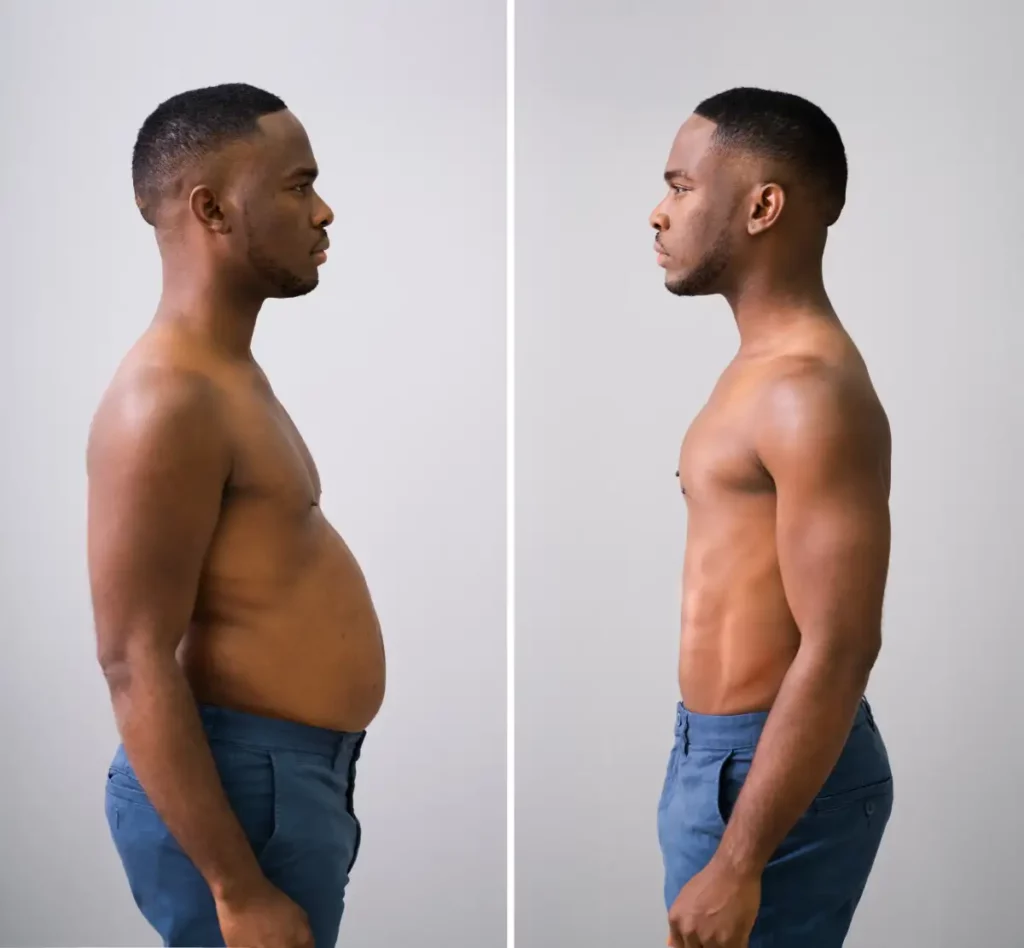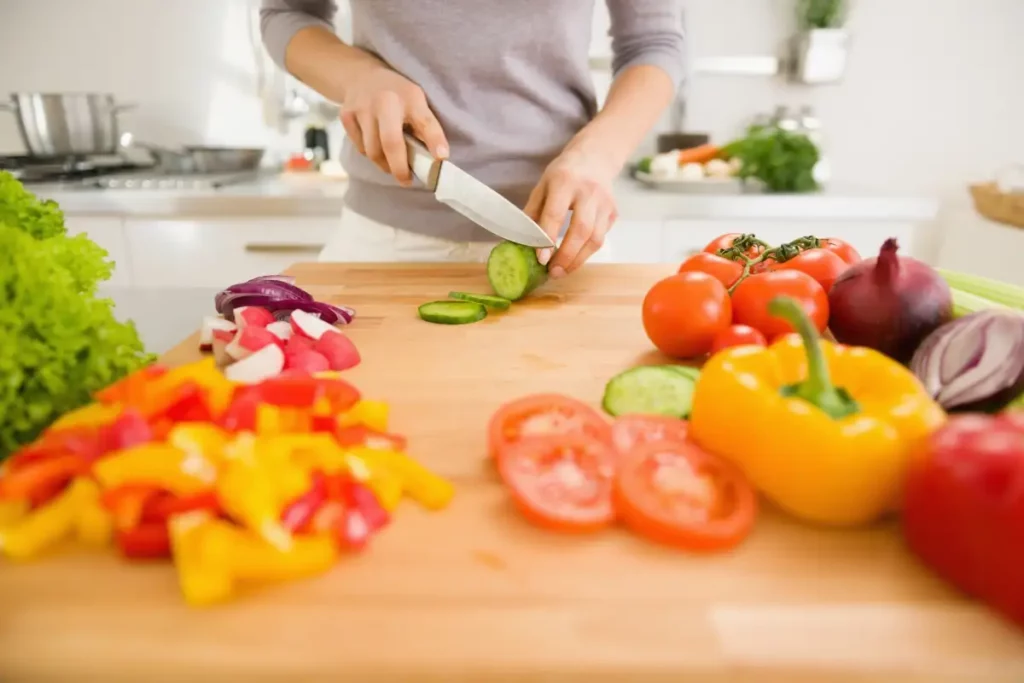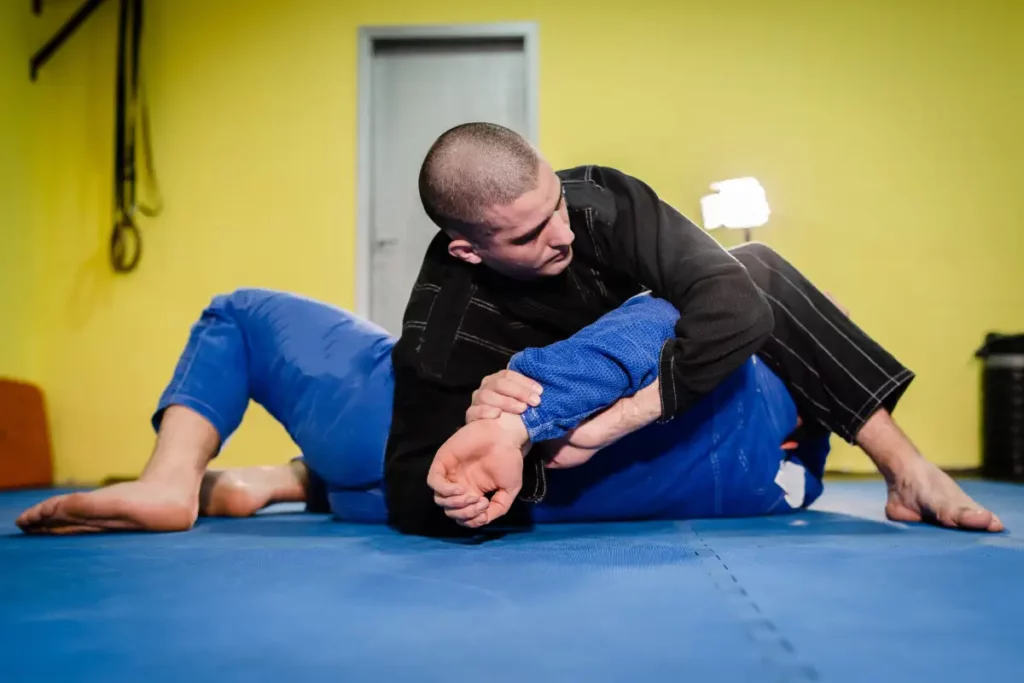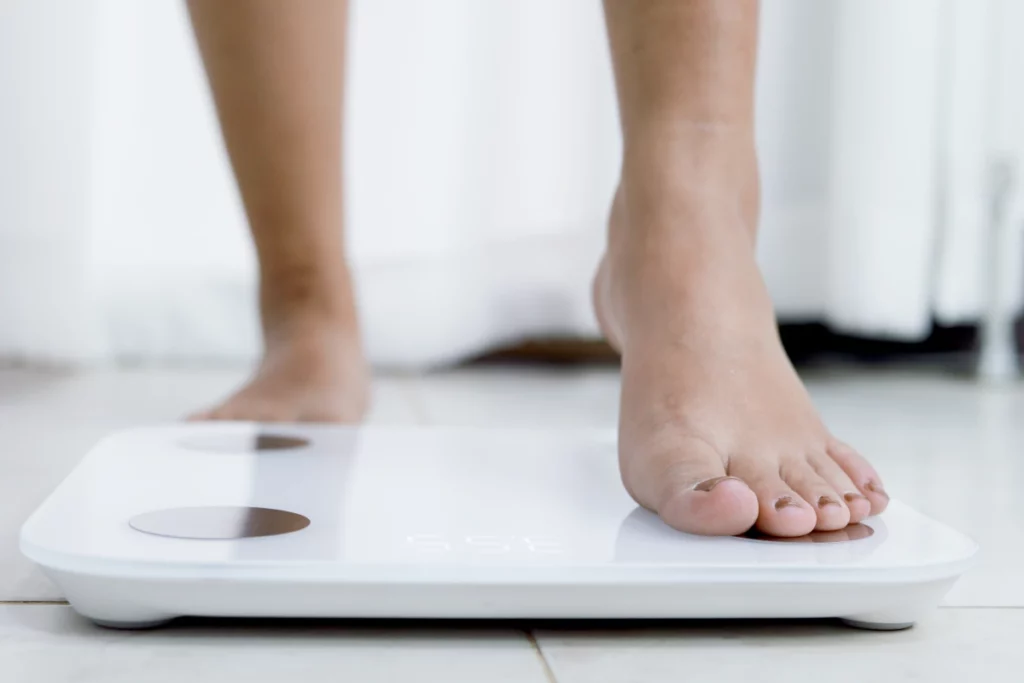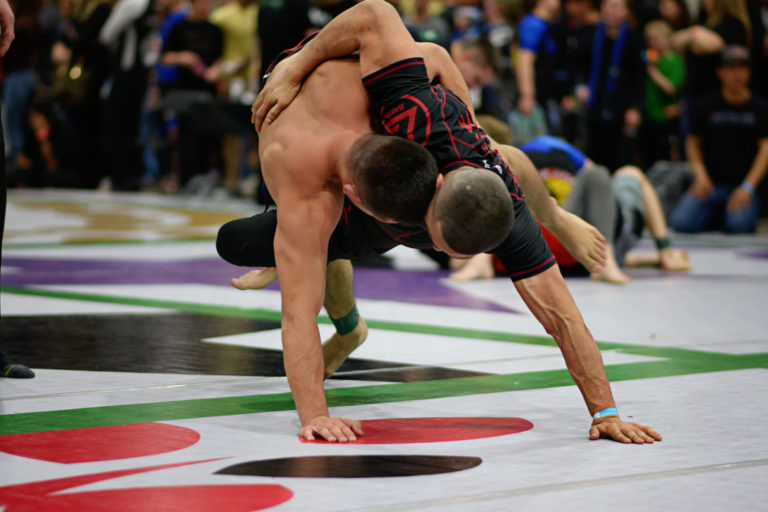
If you consistently struggle to lose weight, BJJ weight loss training may be the right option.
When it comes to the benefits of training Brazilian Jiu Jitsu, BJJ for weight loss is certainly high on the list. I have seen many poeple complete a successful BJJ body transformation after committing to Brazilian Jiu jitsu training and lifestyle.
In fact, training Jiu Jitsu for weight loss is a major reason people begin BJJ classes or sign up for a BJJ gym.
Weight loss from Jiu Jitsu is not the only benefit of training BJJ, but it can be a big one, boosting confidence and training both the mind and body.
With the global rise in obesity, access to solid weight loss strategies and information has never been more important. With endless products offered for weight loss, you might feel overwhelmed finding answers for weight loss strategies.
Whether you want to improve your appearance through six pack abs, defined muscles, or just need to improve your health, Jiu Jitsu can play a role.
While weight loss is a complicated topic, Jiu Jitsu is a beneficial component of any weight loss program. Many BJJ practitioners have an impressive BJJ weight loss transformation after they begin their BJJ training.
In this article, we break down the ins and outs of all the BJJ weight loss benefits and give you the best Jiu Jitsu weight loss methods to help you on your BJJ body transformation.
Benefits of BJJ for Weight Loss
- BJJ is an effective form of exercise for weight loss, burning up to 600 calories per hour.
- Brazilian Jiu-Jitsu is a great way to lose weight because it is an intense full-body workout.
- BJJ is a great way to improve your cardiovascular health and reduce stress.
- Jiu-jitsu encourages healthy lifestyle and eating habits, especially when you train BJJ consistently.
Is BJJ Good for Weight Loss?
Over my years coaching fitness with clients from all walks of life, I’ve observed that weight loss is among the most common fitness goals, alongside muscle building and athletic performance.
In many cases, it is also the most challenging.
I have seen people use everything from Jiu-Jitsu weight training, boxing, Muay Thai, to straight self-defense jiujitsu for weight loss.
In all cases, the overarching factor for successful weight loss is whether someone can commit to the overall healthy eating habits and active lifestyle that is required to lose the weight initially and keep it off long term.
Everything from cardio to CrossFit, lifting weights, bodybuilding, Yoga, Pilates, and powerlifting can be effective for weight loss.
Regardless of your situation or trouble you have losing weight, in my experience, everyone who can commit to the overall BJJ lifestyle can successfully lose weight, regardless of their size.
In this way, I believe the BJJ weight loss approach has some advantages over other forms of fitness training. Many people who begin BJJ with no training background go from little-to-no exercise to training Jiu Jitsu three to four times per week or more.
You quickly learn when starting BJJ that if you eat poorly or overeat leading up to training, you feel like garbage when you roll. I naturally tend to eat less leading up to training to avoid an upset stomach.
When combined with the calories you burn from Jiu Jitsu training, these two lifestyle shifts alone can lead to drastic BJJ weight loss results.
I would expect similar stories whether you do Muay Thai or BJJ for weight loss, given many of the similarities between BJJ and Muay Thai.
Unfortunately, there are no silver bullets with BJJ weight loss. You can train all the jiujitsu you want, but if you consistently overconsume calories, you will fail to lose weight, and can even continue to gain weight.
Combining a healthy diet that maintains your calorie deficit with your BJJ weight loss training is a must for consistent results, and anyone telling you otherwise is not being honest.
The good news is that the calories you burn in BJJ do give you a bit more room on your plate to enjoy than just trying to lose weight with a diet alone.
Additionally, it takes an average of 8-12 years to earn a BJJ black belt.
Most “weight loss programs” last 90 days or less.
While we don’t have a specific study to show BJJ is inherently superior to other caloric-restriction methods, I’ll let you decide which one more likely leads to long term lifestyle change.
How to Lose Weight with BJJ
The following is the step-by-step breakdown of how to go about setting up your BJJ weight loss transformation from a numbers-perspective.
Whether you are jogging or doing BJJ for weight loss, the math remains the same.
You need to eat fewer calories than you burn each day to lose weight. This is known as a ‘caloric deficit’ or ‘energy deficit.’
This deficit is the only way your body will burn stored bodyfat over time, which is generally the goal for any BJJ body transformation.
Any weight loss BJJ program requires you to calculate the number of calories you need to burn each week compared to your current baseline rate.
The hard numbers are as follows: burning a pound of fat requires you to have a 3,500 calorie deficit.
As such, if you are in a 500 calorie deficit every day, you will burn a full pound of fat each week, on average.
For this example, I am going to assume a goal of 1 pound of fat loss per week, which is the commonly recommended target for sustainable fat loss.
Note that you may lose more or less ‘scale weight’ per week due to water fluctuations, but if you stick to the program, the fat will come off.
1. Estimate your average total daily energy expenditure (TDEE)
The first thing you must do for a scientific BJJ weight loss plan is determine how many calories you burn in a day, on average, before adding BJJ into the picture.
This calculation takes your ‘resting metabolic rate’ (RMR), base number of calories your body burns in a day, and then factors in your
A true RMR test requires lab equipment. However, you can estimate your daily energy expenditure using the calculator below, which uses the Mifflin-St Jeor equation to estimate your basal metabolic rate (BMR) and multiplies it by your activity factor.
This can get a bit more complicated if you participate in other activities or what kind of job your work.
Note, do not include your BJJ into your activity level, as we will be calculating the calories you burn in BJJ in the next step.
Activity factors:
- Light: Sedentary lifestyle with little to no exercise, e.g. office work, light walking, or daily tasks.
- Medium: Moderate exercise or activity, e.g. brisk walking, cycling, or light sports, 3-5 times per week.
- Heavy: Intense exercise or activity, e.g. weightlifting, running, or playing sports, 6-7 times per week.
Daily Energy Expenditure Calculator (kCal)
2. Determine How Many Calories You Burn Doing BJJ
Once you have your estimated TDEE, its time to calculate how many calories you will burn during your BJJ weight loss training.
Use the following calculator below to enter in your total training duration for each day you train Jiu Jitsu. You can add this to your TDEE numbers to ballpark your calorie counts in the next step.
You can also just use it to estimate how many calories you burn in BJJ in general.
BJJ Calorie Burn Calculator
3. Track Your Daily Calorie Intake
Unfortunately, consistent and dependable weight loss progress requires you to maintain the discipline to track your calorie intake. The problem with any weight loss plan that does not include calorie counting or monitoring in some form is that most people have the tendency to overeat and cancel out the extra calories burned during BJJ.
It’s entirely possible to have weight gain despite training Brazilian Jiu-Jitsu. Despite the increased metabolism from Jiu-Jitsu, a couple extra snacks full of sugar or drinks of alcohol can quickly wipe out the hard work you put in when training.
In fact, you can lose weight watching videos on the couch just by eating less, focusing on eating healthy foods like chicken and vegetables, and getting enough overall nutrients and sleep.
I don’t recommend weight loss techniques that do not involve exercise, however. Overall, a healthy BJJ diet combined with training leads to much greater BJJ weight losses than reducing calories alone.
Once you establish how many calories you currently eat, its time to determine how much less you will need to eat to lose weight and reduce body fat after accounting for your calories burned in BJJ.
4. Establish Your Caloric Deficit
Depending on whether you train BJJ and how intense your sessions are based on whether they include sparring or just drilling basic movements at low intensity, your daily calorie allotment will change.
You want to aim for a 300-500 calorie deficit range per day, or roughly 2,000-3,500 deficit per week for optimal weight loss.
For example, if your daily baseline energy expenditure is 2,100 calories and you burn 400 calories during Jiu-Jitsu, you would want to eat 2,000-2,200 calories to hit your target deficit.
On days you don’t train BJJ, you would want to reduce your calorie intake down to 1,600 to 1,800 for sustained weight loss.
5. Keep Yourself Accountable
Accountability is key when it comes to actually losing weight long term with BJJ or any other methods.
This means regular, even daily weigh-ins. Additionally, you can tell friends about your goals and desires to lose weight.
Studies show that weight loss often requires an overall lifestyle shift. Switching to healthy fats, monitoring your mood, using tracking apps, and establishing social support systems that support your weight loss, rather than detract from it is vital to reaching your goals.
In time, you can also develop your own mental strategies for BJJ weight loss.
The Science of Weight Loss
Overall research shows that dietary interventions are the most reliable way to lose weight. However, research suggests that exercise can be an effective component of a weight maintenance strategy.
The real challenge with weight loss is sustaining the combination of active lifestyle and healthy eating patterns that keeps the weight off long term.
This is where BJJ shines as a tool for weight loss. If you commit to Jiu Jitsu training, you will quickly find that unhealthy habits catch up to you very quickly on the mats.
What was once an appetizing lunch full of high calorie, nutrient poor, fried food such as a burger, fries, and soda, quickly becomes unappealing when you have upcoming training.
If you’re like many of us who get bit by the BJJ bug, you will learn to swap out unhealthy foods prior to training in favor of healthier options. Even making that shift on just a few meals per week can make a big impact on weight loss when combined with the intense calorie burn of Jiu Jitsu.
Additionally, including resistance training for BJJ helps build muscle, further supporting a healthy lifestyle and helping you lose weight with BJJ.
Given the long term commitment that it takes to get a black belt in BJJ, even a marginal caloric deficit can cause substantial weight loss over the course of your Jiu Jitsu journey.
While making changes to your diet is key for sustainable weight loss, BJJ training burns quite a few calories.
In this way, Jiu Jitsu attacks both sides of the weight loss equation, allowing you to maximize your overall caloric deficit while benefiting from the dietary changes that Jiu Jitsu tends to encourage.
Disclaimer: you should always seek the advice of a registered dietician (RD) when beginning any specific nutrition program or dietary intervention. For general healthy eating guidelines, see the government-approved MyPlate recommendations.
How many calories does BJJ burn?
The calorie burn of BJJ depends on the intensity of your training and the duration. The harder you drill or roll, the more calories you burn. The same goes for training for longer periods or shorter periods.
An average 1.5 hour class including warmups, drilling, and live rolling will burn between 500 and 700 calories, depending on the previously mentioned factors.
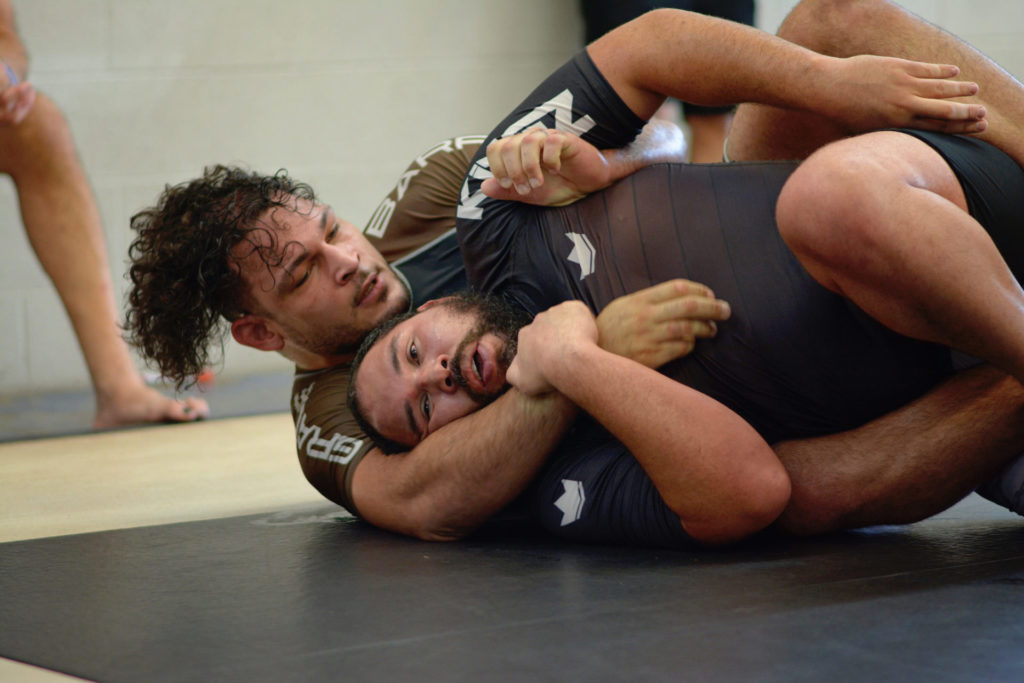
How to Maximize Your BJJ Body Transformation – BJJ Training Tips for Weight Loss
The following tips can help you maximize your overall Jiu Jitsu weight loss during BJJ training.
Generally, BJJ workout routines for weight loss should focus on burning calories in a sustainable manner. As with all brutal truths in martial arts training, there are no real shortcuts.
Increase the intensity of your drilling
Many BJJ classes do not involve drilling with any intensity. Of course, this is needed as you are learning technique.
However, once you have a few paths solidified such as a takedown, guard pass, side control transition, and submission, you can drill it back and forth with a partner at a more realistic pace.
Consider the following training protocol to boost the intensity of the session. Advanced students should train with 20 percent resistance and focus on the rhythm. Beginners should drill more slowly and methodically, but try to keep movement going the entire round.
High Intensity BJJ Drilling
Perform each drill 3 minutes per partner for a round total of 6 minutes per drill, one partner is uke the entire time
- Drill takedown to guard pass
- Drill guard pull to sweep
- Drill guard pass to knee-on-belly to mount transition
- Drill guard pass to mount to submission
This will increase the amount of calories you burn while also improving your technique, but not increase your injury risk compared to an all-out competition roll.
Eat protein after training
Increasing your protein consumption is key to avoiding muscle loss when you are in a caloric deficit.
Consider adding a high protein meal after BJJ training, such as one that includes lean meat or fish.
Even a protein shake after Jiu Jitsu training can help curb any muscle loss when you are training hard and maintaining a caloric deficit.
This extra protein will help you avoid muscle loss and keep you full, thus allowing you to stay in your calorie deficit.
Don’t eat more to compensate for BJJ
Its tempting to overeat after practice.
You finish some hard training, and you feel you deserve a big, rich meal as a reward.
While there is nothing wrong with eating a feast here and there, if your goal is weight loss, avoid the temptation to eat massive amounts of food after practice.
Remember, you probably only burned between 500 and 1,000 calories during training, so eating a 2,000 calorie meal automatically cancels all of that out.
Add weight training to your routine

Adding some weight training to your BJJ routine can help you gain some muscle, burn more calories, and keep you active off the mats.
The extra muscle will also help you burn more calories naturally throughout the day.
Sign up for a competition
This may be the most controversial tip on our list, and it is certainly subjective.
Nevertheless, signing up for a competition and committing to a weight class that’s lighter than you currently walk around gives you an external weight loss goal as well as a deadline for actually reaching your goals.
Does BJJ Get You Ripped? (Video)
Here’s Chewy breaking down some of the Jiu Jitsu weight loss principles we’ve discussed:
Jiu Jitsu Weight Loss Training Frequently Asked Questions (FAQs)
Is Jiu Jitsu a Good Workout?
Yes, Brazilian Jiu Jitsu provides a very substantial full body workout that can burn 500-1,500 calories per session and works virtually every muscle in your body.
Does Jiu Jitsu Build Muscle?
On it’s own, Jiu Jitsu is not going to build a ton of muscle as BJJ does not provide the necessary stimulus for muscle building. However, when combined with weight training, Jiu Jitsu body transformations can be impressive.
How Many Calories Does Jiu Jitsu Burn?
Jiu Jitsu burns anywhere from 300-800 calories per session depending on the intensity of training and total duration.
Is Muay Thai or BJJ better for weight-loss?
Muay Thai and BJJ can both be effective for weight loss. Each burns a lot of calories and encourages a healthy lifestyle. Pick the art you will train most consistently if you want to lose weight
Does BJJ change your body?
Yes, BJJ changes your body in a number of ways. Jiu Jitsu training can help you lose weight and improve your fitness due to the intense physical demands of participating in BJJ.
Will BJJ get me in shape?
BJJ can get you in shape. However, you must also train consistently and follow proper nutrition for Jiu Jitsu if you want the best results.
Losing weight with BJJ: the bottom line
Regardless of your personal reasons for losing weight, BJJ is a great way to get you closer to your weight loss goals.
The above tips can help you maximize your weight loss with BJJ.
Just remember, no matter what you have to eat less than you burn!
Explore similar topics:
- The Best BJJ Strength and Conditioning Program
- The Best BJJ Kettlebell Workouts
- Cross Training for BJJ
Explore other topics:
